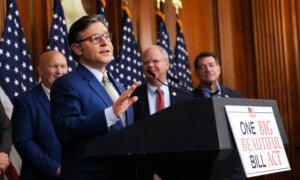Inflation Reduction Act rewrite would block access to key U.S. subsidies starting in 2026.
Chinese clean energy companies would be excluded from tax benefits they enjoyed under the Inflation Reduction Act (IRA), should the One Big Beautiful Bill Act, currently considered by the U.S. Congress, become law.
The act, a budget reconciliation package aimed to implement President Donald Trump’s policy agenda, was passed by the House of Representatives early Thursday by one vote. China solar importers are asking the Senate to change course in their version of the bill.
The IRA, signed into law by President Joe Biden in 2022, is often dubbed the “Green New Deal.” It provided tax write-offs to clean energy producers and manufacturers, primarily of EV batteries, battery storage, solar, and wind.
For China, the IRA was mostly a solar story.
Since the law, no other country has invested more in solar projects in the United States than China.
At least seven Chinese solar companies have announced more than a billion dollars in combined investments into new or existing solar projects in states across the country. Prior to the enactment of the IRA, only Chinese solar multinational Jinko Solar, one of the biggest solar companies in the world, had a factory in Jacksonville, Florida. But since 2022, Ohio, Texas, Alabama, New Mexico, and Arizona have been added to the mix.
It is unclear what will become of these Chinese solar investments. None of the companies has made any pronouncements at this time.
SEIA president Abigail Ross Hopper never mentioned China, but called changes to the IRA “willfully ignorant of the fact that deploying solar … is the only way the U.S. power grid can meet the demand of American consumers, businesses, and innovation.” Hopper later went on to say that without solar, of which China is a dominant force, the United States will see higher electricity bills and “communities nationwide will face blackouts.”
What Would Change for Chinese Solar?
Under the new bill, Chinese companies, the dominant force in U.S. solar under the IRA, would lose the tax credits that made it attractive for companies to invest in solar.
Congress had already exempted so-called “foreign entities of concern” from tax benefits in the CHIPS Act and the Bipartisan Infrastructure Bill. Foreign entities of concern are companies from China, Russia, North Korea, and Iran, or companies with close ties to those governments via corporate management, board members, and investment. However, with the exception of electric vehicle battery components from China, Congress did not apply the same rules to the IRA.
The House-passed bill would change all that for China.
If the Senate keeps the language in this bill intact, Chinese-made solar would no longer qualify for 45Y credits beginning in 2026. Chinese solar manufacturers like Jinko in Florida and LONGi Green Energy Technology in Ohio will no longer be able to write off manufacturing costs under the 45x rule, likely by 2027. The Senate could, in theory, change these time frames before sending the Act to the president’s desk.
Once Trump signs the Act into law, China will no longer qualify for what has amounted to a “double subsidy”—tax breaks from the United States, plus subsidies and other benefits given to parent companies by Beijing and provincial governments back home.
“America stands at the precipice of a once in a generation opportunity to seize energy independence and the corresponding boons for security and economic development that accompany a resurgence of U.S. production,” report authors wrote. “Those opportunities risk being wasted if a short term trade off is made to allow Chinese state-backed players to exploit U.S. industrial policy.”
Original News Source Link – Epoch Times
Running For Office? Conservative Campaign Consulting – Election Day Strategies!


